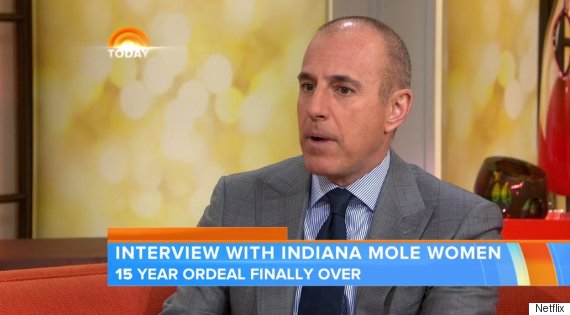 TV
TV In Which We Exercise Materialism To The Extreme
 Monday, March 23, 2015 at 11:31AM
Monday, March 23, 2015 at 11:31AM 
The Point of Tears
by MIA NGUYEN
Unbreakable Kimmy Schmidt
creators Tina Fey and Robert Carlock
With a spirit of a whimsical middle schooler, Kimmy (Ellie Kemper) skips throughout New York City armed with a purple Jansport backpack and two paperback books in Netflix’s new comedic series Unbreakable Kimmy Schmidt. After being held captive for 15 years in an underground bunker with three other women, Kimmy forges a path of her own with minimal survival skills.

For Kimmy, starting anew means shedding her identity as one of the Indiana mole woman. The prospect of putting behind the trauma of Durnsville, Indiana puts Kimmy at ease. Along with adjusting herself to metropolitan life, Kimmy makes grand discoveries in the 21st century like a child peering into a treasure chest for the first time. The show doesn’t belittle Kimmy’s traumatic experiences, whether they would be sexual or physical abuse from cult leader Reverend Richard Wayne Gary Wayne (Jon Hamm).
Behind Kimmy’s infectious, pearly white smile, there lies a thick veil of darkness to her backstory. The underground bunker provided a place for her fears to fester. The sound of velcro makes Kimmy cringe outrageously to the point of tears.
Unlike the other three women, Kimmy has no desire to return to a place that slashed 15 years off her precious life. To start a new life in a new city, one must secure the necessities: job security and shelter. In reality, apartment hunting is stressfull; this stress is almost absent in Unbreakable Kimmy Schmidt. Kimmy scours the classifieds and finds an apartment she’s interested in. She is greeted by Lillian (Carol Kane), an eccentric and spaced out landlord for a potential apartment.

Lillian introduces Kimmy to her downstairs tenant, Titus Andromedon (Tituss Burgess), an aspiring actor who is trying hard to make it big on Broadway and has been for a long time. As a New Yorker, Titus is a resilient improviser when it comes to handling difficult situations head-on. In an episode, Titus constructs a chic and Oscar-winning outfit for Kimmy by using everyday household products: bathroom mat, toilet hardware, among many others.
Jacqueline Voorhees (Jane Krakowski), an Upper East Side Manhattanite, employs Kimmy as a nanny. While working in the Voorhees’ household, she changes her last name from “Schmidt” to “Smith” to prevent anyone from discovering her Indiana mole women status. As a nanny, Kimmy excels in interacting with Mrs. Voorhees' moody teenage stepdaughter, Xanthippe (Dylan Gelula) who is under the full suspicion that Kimmy has something to hide. Kimmy naturally becomes her confidant while on the job throughout the series.

Mrs. Voorhees exercises materialism to the extreme and has a refrigerator stocked with off-brand FIJI water labeled “diet water.” Wealthy people always have an abundance of white towels and a fridge stocked with the same items. When she offers Kimmy a bottle to hydrate, Kimmy politely declines, and proceeds to toss it into the waste basket. As a teenager, Mrs. Voorhees dyed her hair blonde and moved away from her home of South Dakota. Her origins and backstory appear to have broken elements that will hopefully appear in the second season.
Creators Tina Fey and Robert Carlock successfully build a successful female heroine with a group of equally charming, eccentric supporting actors. Along with the diversity of the cast, the comedic one-liners make audience members fall to their knees. The range of racial stereotypes represented on the show aren’t intended to be mean spirited. Kimmy’s GED study partner Dong (Ki Hong Lee) is a Chinese delivery guy who wins the affection of Kimmy. One of the character faults is his character being built around sexual jokes surrounding the origins of his Vietnamese name, which has sexual connotations. It’s a cheap comedy trope, and Fey has been criticized for this kind of stuff before.

The show features the upbeat pace and cadence of Fey's 30 Rock, ensuring its appeal to existing fans of Fey and Carlock’s work. Watching the entire series in one sitting closely resembles the feeling of witnessing a stream of candy fall out from a paper mâché piñata at a child’s birthday party. It’s rewarding and sweet. We glimmer at her childlike freedom. Something we wished we still had.
Mia Nguyen is the features editor of This Recording. You can find her website here.

"Hold No Guns" - Death Cab for Cutie (mp3)

 mia nguyen,
mia nguyen,  tina fey
tina fey 

























































